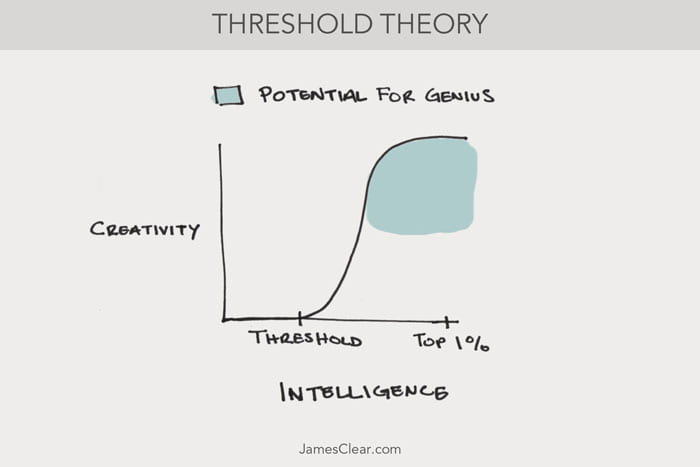After reading the book, Atomic Habits, by James Clear, our class was given the opportunity to read between the lines, and do some external research. One of these opportunities was reading the many articles on the author’s website, JamesClear.com. After scanning through the first couple articles, one caught my eye. I would like to think that I am a creative person, in fact, it is one of my most valued traits. When I stumbled upon an article on creativity, I felt obliged to continue reading.
The article I picked was “Creativity Is a Process, Not an Event,” and it happened to outline some of the questions I have around creativity. Like most of James Clear’s articles, the titles truly encompass what he writes about. This is different than the clickbait I am used to. The article summarizes that creativity is not an event it’s a process, it isn’t a eureka moment. You have to work through mental barriers and internal blocks. You have to commit to practicing your craft deliberately. You have to stick with the process for years, and not let failure or embarrassment get in your way. James Clear outlines the many different ways that prohibit, as well as permit creativity, one of them being a growth and fixed mindset, a topic we have encountered before. Another recurring topic is that you need to work hard, practice deliberately and put in your reps. I remember this being a focal point in his book, Atomic Habits.
“As I mentioned in my article on Threshold Theory, being in the top 1 percent of intelligence has no correlation with being fantastically creative. Instead, you simply have to be smart (not a genius) and then work hard, practice deliberately and put in your reps.” – James Clear
This article also connects being creative to some of the freedoms we have now in self isolation during the COVID-19 pandemic. Although I realize that some of these connections are subjective, I believe these paths to unlocking your inner creativity can be shaped to fit your schedule. One of the connections Clear makes is that some people now have the ability to sleep a little longer, whether that is because they don’t have to drive to work every day, or don’t have a set school schedule (like me). Clear explains that, “The findings of a study suggest sleep debt is cumulative and if you get 6 hours of sleep per night for two weeks straight, your mental and physical performance declines to the same level as if you had stayed awake for 48 hours straight. Like all cognitive functions, creative thinking is significantly impaired by sleep deprivation.”
Another connection is that we now have the free time to go outside and enjoy sunshine and nature. James Clear explains that, “One study tested 56 backpackers with a variety of creative thinking questions before and after a 4-day backpacking trip. The researchers found that by the end of the trip the backpackers had increased their creativity by 50 percent. This research supports the findings of other studies, which show that spending time in nature and increasing your exposure to sunlight can lead to higher levels of creativity.” I have started to implement these two creativity enablers in my daily life. I have started to go to sleep earlier and wake up later, as well as eating breakfast and lunch outside. I have also been taking hikes in the forest and appreciating the nature around me.
In class, most of our learning is formulated through Core, and Curricular Competencies. The competencies that have focused our learning recently in PGP are:
-
Connect: How do I communicate and collaborate to build understanding?
-
Reflect: How do I reflect to build knowledge?
The way that I want to address these competencies is by highlighting a few points that I have learned while reading this article and believe are worth sharing.
Point One:
- Positive psychology research has revealed that we tend to think more broadly when we are happy. This concept, known as the Broaden and Build Theory, makes it easier for us to make creative connections between ideas. Conversely, sadness and depression seems to lead to more restrictive and limited thinking. Thus, I have realized that it is important that I create habits in my life that bring me happiness. This in turn, will increase my creative abilities and allow me to pursue my passions.
Point Two:
- The story of the falling apple has become one of the lasting and iconic examples of the creative moment. It is a symbol of the inspired genius that fills your brain during those “eureka moments” when creative conditions are just right. What most people forget, however, is that Newton worked on his ideas about gravity for nearly twenty years until, in 1687, he published his groundbreaking book. The falling apple was merely the beginning of a train of thought that continued for decades. I find this incredibly helpful in my thought processes around creativity. To understand that creativity is a process and not just the moment of creative genius, reduces the pressure I put on myself, and in turn, allows me to be more creative.
Citations:
Clear, James. “Debunking the Eureka Moment: Creative Thinking Is a Process.” James Clear, James Clear, 12 June 2018, jamesclear.com/creative-thinking. Assessed May 6, 2020.



